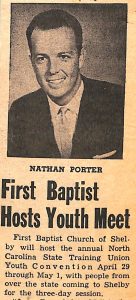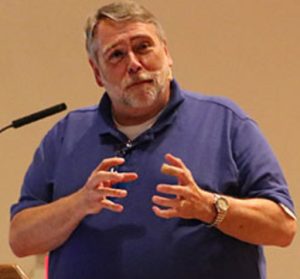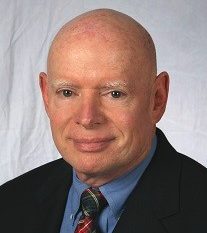A prince of a guy who loved challenging youth to consider a call to ministry and, on the other hand, someone who was the conscience of many Southern Baptists on poverty and race relations.
That’s how friends are remembering Nathan Porter, who died at the age of 90 Oct. 3 in Waco, Texas.
The son of missionaries to Brazil, Porter was a former pastor and two-time employee of the Southern Baptist Home Mission Board in Atlanta. He worked for Southern Baptists for 30 years, much of the time in college evangelism.
 He earned master’s and doctoral degrees from Southern Baptist Theological Seminary in Louisville, Ky., and excelled in everything from working in race-related issues to fundraising for global poverty with the Baptist General Convention of Texas.
He earned master’s and doctoral degrees from Southern Baptist Theological Seminary in Louisville, Ky., and excelled in everything from working in race-related issues to fundraising for global poverty with the Baptist General Convention of Texas.
Early in his career, in 1965, he helped found the denomination’s US-2 program, where young adults served alongside career missionaries throughout the United States. For many this was an introduction to hands-on ministry, and some eventually returned as career missionaries themselves.
In that capacity Porter traveled the nation, speaking in churches, at county-wide evangelistic youth rallies, and on college campuses as he challenged the nation’s youth to consider a call to full-time ministry. That call was indirectly fueled by the 1960s Jesus Movement which witnessed a revival on campuses nationwide and an outpouring of evangelistic zeal.
Joe Graham, who served nearly 40 years in collegiate ministry through the Georgia Baptist Convention, described Porter as “the embodiment of missions, especially being an MK (missionary kid) himself. He knew firsthand what he was talking about, and his Portuguese accent made it even more relevant.”
It was during Graham’s early days as a campus minister at Berry College that he first came into contact with Porter.
“I was young myself and had never heard of him, but the more I learned the more interested I became. He was one of those people who you decide to sit up and listen to, to learn from, since all those you respect were learning from him,” he explained.

Joe Graham
Porter eventually left the agency to serve as pastor of First Baptist Church of Arkadelphia, Ark. He then returned to the Home Mission Board, serving through the Christian Social Ministries Department. The department, later renamed Church and Community Ministries, was a cutting-edge outreach program that included domestic hunger work, ministries to singles, ministries with substance abusers, Sellers Baptist Home and Adoption Center, church and community ministries, work in the criminal justice system, ministry to the blind and disabled, and a new program named disaster relief.
Through social work efforts in those agencies, the department created evangelism opportunities to express Christian love and to provide a Christian witness by ministering to people with special needs.
Working closely with the underprivileged, Porter established himself as an outspoken critic of a society that turns a blind eye to the needy. He challenged congregations — as well as the nation — to fully respond to Christ’s teaching of helping the poor from their abundance of riches. That made him an outspoken voice on the subject of race relations during a time of social unrest.
“Nathan was one of those individuals who, back in the day, said the things others were afraid of saying.”
“Nathan was one of those individuals who, back in the day, said the things others were afraid of saying,” Graham remembered. “He was a voice of conscience for Southern Baptists, especially in the areas of missions and race relations. He often took some heat for reminding us of what Scripture actually says.”

Gerald Hutchinson
Gerry Hutchinson remembers frequently rooming with Porter through meetings that took them across the nation. They served alongside each other in the Church and Community Ministries department.
“Nathan was a drum major for justice and our point person for domestic hunger,” Hutchinson said. “As Southern Baptists became more aware of worldwide hunger, especially in Africa, they gave freely to the World Hunger Day offering. The Home Mission Board received a portion of that for impoverished areas of the nation.”
In those days, the HMB supported a minimum of 95 staffed Baptist Centers nationwide, providing a community focus for the needy. Porter distributed those funds to the ministry centers that included food pantries, food kitchens and special outreach to children and seniors long before “food insecurity” became a phrase.
“Nathan was passionate about world and domestic hunger, following Christ’s teachings, and he was not afraid about speaking truth to power.”
“Nathan was passionate about world and domestic hunger, following Christ’s teachings, and he was not afraid about speaking truth to power,” Hutchinson recalled.
Cecil Etheridge of suburban Atlanta was a co-worker with Porter and remembers his outgoing personality. “He was young and related very well to those both on the college campuses and to our younger missionaries. He liked everyone and had time for anyone who needed a listening ear.”
Etheridge, who is 97, was especially saddened to learn of his friend’s passing “at such a young age. It just makes me wonder why I have been given a few years longer than Nathan. It just doesn’t seem right for him to be gone and for me to still be here when he had so much yet to give.”
Porter retired to Waco near his alma mater, Baylor University, where his father and grandfather had served on the faculty. He is survived by three children: Becca Porter Holloway of Baltimore, Md.; Leslie Porter Smith of Waco; and Joel Porter of Waco; five grandchildren and four great-grandchildren.
He was preceded in death by his wife, Fran Porter, in 2006.
Related articles:
Former mission board worker fights for NAMB support for ailing wife
Former mission board worker gets anonymous gift for ailing wife


